An innovative initiative is developing versatile, scalable, replicable solutions to modernise DHW systems
The solution proposed by the HAPPENING initiative involves installing decentralised cascade heat pumps. It can be quickly installed, takes up little space and adapts easily to a range of building types. It also offers major savings, enhances comfort inside the home and considerably reduces CO2 emissions, helping to comply with EU goals. In Europe, buildings account for 40% of the demand for energy and 36% of CO2 emissions.
One of the aims of the HAPPENING initiative -HeAt PumPs in existing multi-family buildings for achieving union’s ENergy and envIroNmental Goals, headed by TECNALIA, is to use heat pumps to decarbonise multi-home buildings. The technology is ideal for use with renewable energies, and can be used for both air conditioning and for domestic hot water (DHW) production. Despite their many advantages, heat pumps are not widely installed in multi-home residential buildings.
The HAPPENING consortium will monitor three pilot projects in towns in Spain, Italy and Austria. As well as coordinating these projects, TECNALIA experts will also implement one of them, in partnership with Barrizar, in Ispaster, in the Bizkaia region of Spain. The pilot projects are expected to demonstrate the technical and financial viability of the solution, in this case by developing and promoting new business and/or funding models.
Building Energy Systems
A package of versatile, scalable, replicable solutions to modernise building energy systems will be developed and evaluated. Among other advantages, they are expected to allow for more than 70% renewable energies to be used, save over 30% in primary energy and greenhouse gases, reduce planning time by 50% and installation/operating time by 30%, as well as allowing energy service companies and investors to recoup their investment in under eight years.
More information
- HAPPENING is a European consortium of twelve companies from four countries: TECNALIA, Girotze, Barrizar, ANESE and Green Building Council España (Spain); EURAC, Tecnozenith, INNOVA and RINA-C (Italy); AEE INTEC and GWS, Austria; and Fraunhofer (Germany).
- Project launch press release.
 Este proyecto ha recibido financiación del programa de investigación e innovación Horizon 2020 de la Unión Europea en virtud del acuerdo de subvención N° 957119.
Este proyecto ha recibido financiación del programa de investigación e innovación Horizon 2020 de la Unión Europea en virtud del acuerdo de subvención N° 957119.







